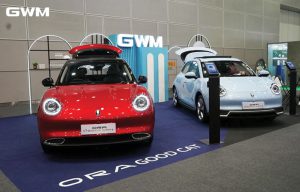BLOOMBERG
Thailand’s electric vehicle (EV) sales may double this year as Chinese manufacturers prepare to roll out their first locally manufactured models and about $2.4 billion in government incentives boosts consumer demand.
New battery EV registrations are likely to top 150,000 by the end of the year, Krisda Utamote, president of the Electric Vehicle Association of Thailand, said in an interview in Bangkok. That will push the vehicles’ share of total passenger car registrations to 20% this year, from 12% last year and single-digits in 2022, he said.
Demand for EVs is booming in Thailand after the government cut import and excise taxes and gave cash subsidies to buyers in exchange for automakers’ commitment to start local production — all part of a renewed push to uphold its long-time standing as a regional auto hub.
The measures, which started in 2022 and have been extended through 2027, have attracted a flurry of investments. Major Chinese carmakers like BYD Co and Great Wall Motor Co are among those setting up local plants that should both boost the country’s manufacturing clout and help it meet its target for carbon neutrality by 2050.
“This year will see the first domestic roll-outs by many manufacturers who signed up for the first incentive scheme and committed to local production,” said Krisda, who added that the program was also accelerating domestic purchases.
Annual EV registrations could even surge to 225,000 units in 2025, which would meet the target laid out by the National EV Policy Committee for new-energy vehicles to hit 30% of total passenger car usage that year, he said.
Thailand’s auto industry faces at least one major headwind to continuing its rapid expansion. The number of public charging stations may fail to keep up with EV sales, denting the cars’ appeal to mass market buyers, Kasikornbank Pcl’s research centre said in an October report.
Krisda said Thailand, which has about 90,000 battery-powered cars and 54,000 plug-in hybrids, has the infrastructure to support the growing industry. There were more than 8,700 public chargers at about 2,200 locations around the nation as of September, according to the group.
That means an average of one public charger for every 16.5 EVs, putting Thailand slightly behind the global average of 15.9 estimated in an index compiled by European consulting firm Roland Berger. The nation now sits in line with neighbours Malaysia and Indonesia, as both ramp up their respective EV industries.
There’s also a risk of investment cooling after Thailand decreased some benefits in its latest incentive package. South Korea’s Kia Corp scrapped a plan to build an assembly plant in Thailand after it failed to reach an agreement with Thailand’s Board of Investment regarding incentives, Yonhap reported. Instead, it will open a sales unit in the country.
Still, Chinese carmakers are leading the charge to start local production in 2024, a crucial first step towards Thailand’s goals. Chinese-owned brands occupied all but one of the top five best-selling EVs in Thailand last year, with Tesla Inc ranking fourth, government data showed.
Great Wall Motor unveiled a local production line for the new Ora Good Cat, the first battery-powered EV model to be made and sold commercially in Thailand. More Chinese EV makers are expected to follow suit, with BYD and Hozon New Energy Automobile Co both expected to start local manufacturing this year.
Despite the rollback of some incentives, the Southeast Asian nation still offers long-term opportunities for foreign carmakers, according to Krisda.
“There’s growing demand in Thailand that raises stakes for investment. Nobody is backing down,” he said. “Nobody wants to get left behind as the EV train takes off.”
 The Gulf Time Newspaper One of the finest business newspapers in the UAE brought to you by our professional writers and editors.
The Gulf Time Newspaper One of the finest business newspapers in the UAE brought to you by our professional writers and editors.
